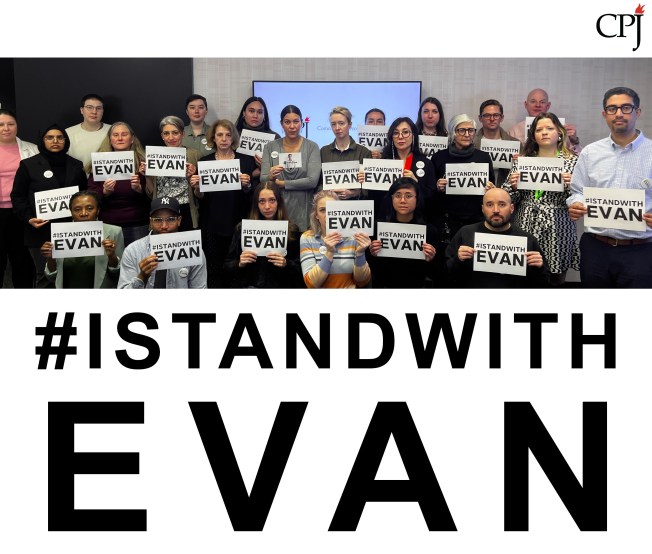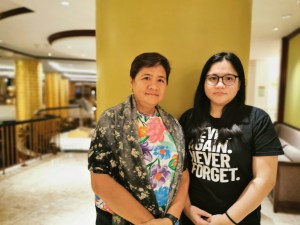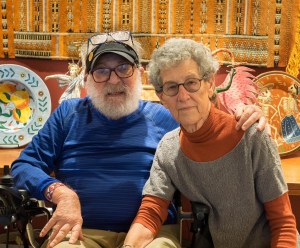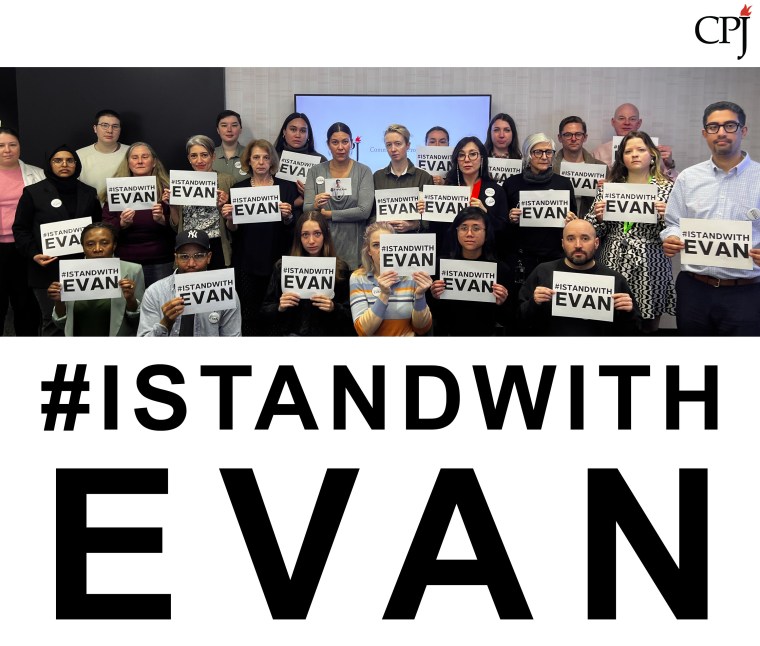CPJ staff recognize imprisoned journalist Evan Gershkovich

It has been a year since Russia detained Wall Street Journal reporter Evan Gershkovich during a reporting trip and falsely accused him of espionage. CPJ staff gathered in recognition of his imprisonment to renew calls for his immediate release as he faces up to 20 years in a Russian prison. Gershkovich’s unjust arrest is a brazen violation of press freedom and not only poses far-reaching consequences to journalism and the media but also to governments and democracies everywhere. Russia is the world’s fourth worst jailer of journalists with at least 22 journalists behind bars last year, including Gershkovich and Alsu Kurmasheva, a U.S.-Russian journalist. You can share Evan’s reporting and the latest updates on his situation by visiting WSJ.com/Evan to help keep his story front and center.
‘A long fight’: Family of murdered Philippine journalist Gerry Ortega on their 13-year battle for justice

Philippine journalist and environmental activist Gerardo “Gerry” Ortega vowed he wouldn’t let death threats stop him from using his radio show to expose corruption on the country’s idyllic tropical island of Palawan. Ortega was gunned down in 2011 outside a thrift store in Palawan, shortly after his morning broadcast. More than 13 years later, Reyes – the alleged mastermind behind Ortega’s murder – remains at large, despite an outstanding warrant for his arrest. A gunman was sentenced to life in prison in 2013.
In March, CPJ and media freedom groups Free Press Unlimited and Reporters Without Borders met with Philippine authorities in the capital city of Manila to provide new information about where Reyes may be hiding. Philippine national police and the Justice Department pledged to take action. While there, CPJ’s Asia Program Coordinator Beh Lih Yi spoke with Ortega’s daughter, Michaella, and wife, Patria, about their family’s fight for justice. Writing later on LinkedIn, Michaella remarked, “Grateful to Beh Lih Yi and [the] Committee to Protect Journalists for their unwavering commitment to seeking justice for slain journalists like my father, Doc Gerry Ortega. It is precisely this kind of support that gives us the courage to continue, while each year that passes takes something from us, each act of solidarity renews our hope.”
The interview has been edited for length and clarity. A longer version can be found here.
The case has dragged on for 13 years. Why hasn’t full justice been served?
Patria: I don’t know if it’s the system, or the people inside the system. In our case, we have all the evidence. If the case doesn’t go anywhere, or we lose, then it’s a signal to the people.
Michaella: A lot of international organizations have rightfully assessed that the Gerry Ortega case is emblematic of the level of impunity in the Philippines. This is a strong case, a lot of public interest, public pressure. Civil society organizations across sectors – environmentalists, human rights, journalists – have pushed for accountability, and yet it’s moving at a snail’s pace. It really shows you the deeply entrenched corruption.
Dad was a loud voice. A voice that held corrupt practices to account, a voice that was speaking truth to power – and then that voice was snuffed out. There was no way that the system could protect these voices.
He highlighted several issues through his journalism. Are they still relevant today?
Michaella: Very relevant. He was an anti-corruption advocate. He was also pro-environment, and then he did radio broadcast. He really wanted to make sure the government serves the people. It’s not only these issues are still relevant today, but that people like him are dwindling. These are the very voices that you need in times like this, but loud and brave voices are getting snuffed out. It’s very, very difficult to speak out anymore.
You said people like Ortega are dwindling. What does that mean for local journalism?
Michaella: The media landscape is very different now. The killing of journalists, the injustice and impunity could continue to happen. It’s very difficult for us as people, as community to believe that anything can be better. It’s very difficult to convince people of that anymore. When dad was alive, he was the most popular radio commentator in Palawan. How’s that possible? It’s because, somehow, people were able to imagine a better world.
Ortega was threatened before he was killed, yet he continued with his radio broadcast.
Patria: He would say that if they kill you, they kill you. He was banking on his spirituality
Michaella: He felt like it was his duty to serve the people.
What has it been like fighting for justice for 13 years?
Michaella: When we started out – in the first week after dad was killed – we were having conversations about how we define what justice looks like. We were not into the thing that my dad was doing. I had just graduated from college. My mom was busy with her [veterinary] clinic – it was a different life that we were pulled into. Suddenly we were meeting lawyers, investigators, people from the government, and we were in front of cameras. It was a weird thing when we had just lost someone. Nobody trained us for this.
So as a way for us to regain some sense of agency, we were asking ourselves – how do we define justice? Why are we even doing this? Why are we showing up?
One of the ways that we have justified it to ourselves is that why we kept showing up is because of justice – obviously to see the conviction of the mastermind – but more importantly, it doesn’t stop there.
Real justice is when there’s enough of a change in the culture, in the system, that people like Gerry Ortega will survive, will thrive, and will have their voices heard.
Is this what keeps you going?
Patria: It’s a long fight. We have to start with the kids. I’m telling people, if there is only one person who talks about the evil of the society, most probably that person will die. But if there are more people [doing the same], then it’s going to be difficult to kill all of them.
Michaella: We show up hoping that it will have some effect. It becomes harder and harder each year – but if we can have some effect that someone like him would be protected, would not be shot, then we’ve shown that the system can exercise justice.
What do you hope to see next now that new leads of the case have been given to the Philippine authorities?
Patria: I hope the government will act on it. When you don’t shine light on evil people, they will continue to do their thing.
Michaella: We fight because we hope to be able to contribute to our community. We have fought precisely because of that kind of support from civil society that we’re not left behind to fend for ourselves. That’s the reason why we can continue to show up. We wouldn’t be able to fight if other people stopped showing up first. Everyone continues to show up, continues to knock on doors, finding the next window [of opportunity for justice], that’s the major reason why we even have any kind of energy to continue to do this.
The Power of Purposeful Giving: The Gold Family’s Story

Barbara Gold, a pediatrician, and her husband Steve Gold, a disability rights lawyer, first became acquainted with CPJ when their son, Texas Monthly journalist Russell Gold, who was the chief energy reporter for The Wall Street Journal for 25 years, requested that they make a donation instead of giving him a birthday gift. The Gold family has a longstanding tradition of supporting charitable causes. As Barbara said, “We decided that gifts were just more consumerism […] we would say this is a much more important way to make the world a better place for your children and grandchildren than giving them another sweater they don’t like.”
Since their initial contribution, the Golds have remained steadfast supporters, advocating for press freedom among friends, family, and their condo community. In October 2023, Barbara delivered a well-received presentation on press freedom and CPJ’s mission to her community. Making the case for a free press in a world of deteriorating trust in the news can be difficult, yet Barbara felt it was important and believed her presentation may have instigated a shift in perspective among her friends.
As avid readers of newspapers since high school, the Golds value the impact of journalism, particularly in the current climate where accurate, vetted reporting is paramount. “People need to know the truth,” Barbara told CPJ, “They need to know what’s going on. [Journalism] is a check against false truths. I don’t know how you get that except from the press.”
With the 2024 U.S. election approaching, the Golds are deeply concerned about the proliferation of disinformation. Barbara emphasized the necessity of CPJ’s work in the coming years, “The need for CPJ in the next four years is going to be unbelievably crucial. It’s going to be crucial in any case, but once someone has clung onto disinformation they get from the internet, it’s impossible to change their mind. So, the work of free journalism, of investigative, unbiased journalism becomes literally lifesaving to our democracy.”
The Golds describe their charitable giving as “focused.” Steve grew up blue-collar and Barbara was from a middle class family so they are thrilled to be in a position to make a difference through the organizations they invest in, with CPJ high on their list. Their commitment reflects a deep-seated belief in the power of everyone’s right to be informed: something that can only happen if the press can bring us the news safely and without fear of reprisal. As they continue to champion these values within their community and beyond, the Golds serve as inspiring examples of the profound impact individuals can have in nurturing a free and informed society.
Must-read
CPJ is looking into whether Haitian prosecutor Ronald Richemond ordered the murder of journalist Garry Tesse, who was killed nearly a year-and-a-half ago. A former member of Richemond’s security team has provided new details on the alleged plot, claiming Richemond responsible, and the country’s public ombudsman has referred to the killing as an assassination “carried out to silence those journalists who attack corruption and abuses of power.”
CPJ spoke with Ataf Mohamed, editor-in-chief of the Sudanese independent newspaper Al-Sudani, about Sudan’s communications blackout amid war between the Sudanese army and the paramilitary Rapid Support Forces (RSF). Running his newsroom from the Egyptian capital Cairo, Mohamed told CPJ, “It is like we are back to the dark ages. At this point, it might be easier to rely on pigeons to send messages across the country, but I am sure that they would be hunted down by the RSF and sold as food….”
CPJ in the news
“Jailed in Putin’s Russia for Speaking the Truth,” The New York Times
“The 95,” This American Life
“Assange conviction ‘would be a blow for journalism across the world,’” France24
“EU Adopts Act to Safeguard Media,” VOA
“Detained: The heartbreaking ordeal of journalist Alsu Kurmasheva,” CBS News
“Drone footage raises questions about Israeli justification for deadly strike on Gaza journalists,” The Washington Post
“‘Enough is enough’: World’s journalists urge PH to solve Gerry Ortega killing,” Rappler
“Evan Gershkovich Has Been In Prison In Russia For A Year,” WNYC
“Ethiopian police release French journalist after a week, employer says,” Reuters
“International Media Condemns Israeli Attacks on Palestinian Journalists in Gaza,” Haaretz
